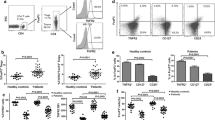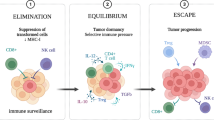Abstract
Objectives
Lung cancer is the leading cause of cancer-related death in the USA. Regulatory T cells (Tregs) normally function to temper immune responses and decrease inflammation. Previous research has demonstrated different subsets of Tregs with contrasting anti- or pro-inflammatory properties. This study aimed to determine Treg subset distributions and characteristics present in non-small cell lung cancer (NSCLC) patients.
Methods
Peripheral blood was collected from healthy controls (HC) and NSCLC patients preceding surgical resection, and mononuclear cells were isolated, stained, and analyzed by flow cytometry. Tregs were defined by expression of CD4 and CD25 and classified into CD45RA+Foxp3int (naïve, Fr. I) or CD45RA−Foxp3hi (activated Fr. II). Activated conventional T cells were CD4+CD45RA−Foxp3int (Fr. III).
Results
Samples from 23 HC and 26 NSCLC patients were collected. Tregs isolated from patients with NSCLC were found to have enhanced suppressive function on naive T cells. Cancer patients had significantly increased frequencies of activated Tregs (fraction II: FrII), 17.5 versus 3.2 % (P < 0.001). FrII Tregs demonstrated increased RORγt and IL17 expression and decreased IL10 expression compared to Tregs from HC, indicating pro-inflammatory characteristics.
Conclusions
This study demonstrates that a novel subset of Tregs with pro-inflammatory characteristics preferentially expand in NSCLC patients. This Treg subset appears identical to previously reported pro-inflammatory Tregs in human colon cancer patients and in mouse models of polyposis. We expect the pro-inflammatory Tregs in lung cancer to contribute to the immune pathogenesis of disease and propose that targeting this Treg subset may have protective benefits in NSCLC.






Similar content being viewed by others
Abbreviations
- ADC:
-
Adenocarcinoma
- CC:
-
Colon cancer
- CFSE:
-
Carboxyfluorescein succinimidyl ester
- FACS:
-
Fluorescence-activated cell sorting
- Foxp3:
-
Forkhead box P3
- Fr:
-
Fraction
- HC:
-
Healthy control
- IL-10:
-
Interleukin 10
- IL-17:
-
Interleukin 17
- MC:
-
Mast cells
- MNC:
-
Mononuclear cells
- NSCLC:
-
Non-small cell lung cancer
- PB:
-
Peripheral blood
- PBMC:
-
Peripheral blood mononuclear cells
- RORγt:
-
Retinoic acid receptor related orphan receptor gamma T
- SCC:
-
Squamous cell cancer
- TH17:
-
T helper 17 cells
- Tregs:
-
T regulatory cells
References
Jemal A, Bray F, Center MM, Ferlay J, Ward E, Forman D (2011) Global cancer statistics. CA Cancer J Clin 61(2):69–90
Sakaguchi S, Miyara M, Costantino CM, Hafler DA (2010) FOXP3 + regulatory T cells in the human immune system. Nat Rev Immunol 10(7):490–500
Khazaie K, von Boehmer H (2006) The impact of CD4+CD25+ Treg on tumor specific CD8 + T cell cytotoxicity and cancer. Semin Cancer Biol 16(2):124–136. doi:10.1016/j.semcancer.2005.11.006
Gounaris E, Blatner NR, Dennis K, Magnusson F, Gurish MF, Strom TB, Beckhove P, Gounari F, Khazaie K (2009) T-regulatory cells shift from a protective anti-inflammatory to a cancer-promoting proinflammatory phenotype in polyposis. Cancer Res 69(13):5490–5497. doi:10.1158/0008-5472.CAN-09-0304
Blatner NR, Bonertz A, Beckhove P, Cheon EC, Krantz SB, Strouch M, Weitz J, Koch M, Halverson AL, Bentrem DJ, Khazaie K (2010) In colorectal cancer mast cells contribute to systemic regulatory T-cell dysfunction. Proc Natl Acad Sci USA 107(14):6430–6435
Erfani N, Mehrabadi SM, Ghayumi MA, Haghshenas MR, Mojtahedi Z, Ghaderi A, Amani D (2012) Increase of regulatory T cells in metastatic stage and CTLA-4 over expression in lymphocytes of patients with non-small cell lung cancer (NSCLC). Lung Cancer 77(2):306–311
Miyara M, Yoshioka Y, Kitoh A, Shima T, Wing K, Niwa A, Parizot C, Taflin C, Heike T, Valeyre D, Mathian A, Nakahata T, Yamaguchi T, Nomura T, Ono M, Amoura Z, Gorochov G, Sakaguchi S (2009) Functional delineation and differentiation dynamics of human CD4+ T cells expressing the FoxP3 transcription factor. Immunity 30(6):899–911
Blatner NR, Mulcahy MF, Dennis KL, Scholtens D, Bentrem DJ, Phillips JD, Ham S, Sandall BP, Khan MW, Mahvi DM, Halverson AL, Stryker SJ, Boller AM, Singal A, Sneed RK, Sarraj B, Ansari MJ, Oft M, Iwakura Y, Zhou L, Bonertz A, Beckhove P, Gounari F, Khazaie K (2012) Expression of RORgammat marks a pathogenic regulatory T cell subset in human colon cancer. Sci Transl Med 4(164):164ra159
Blatner NR, Gounari F, Khazaie K (2013) The two faces of regulatory T cells in cancer. Oncoimmunology 2(5):e23852
Bos PD, Rudensky AY (2012) Treg cells in cancer: a case of multiple personality disorder. Sci Transl Med 4(164):164fs144
Sakaguchi S, Ono M, Setoguchi R, Yagi H, Hori S, Fehervari Z, Shimizu J, Takahashi T, Nomura T (2006) Foxp3 + CD25 + CD4 + natural regulatory T cells in dominant self-tolerance and autoimmune disease. Immunol Rev 212:8–27
Wolf AM, Wolf D, Steurer M, Gastl G, Gunsilius E, Grubeck-Loebenstein B (2003) Increase of regulatory T cells in the peripheral blood of cancer patients. Clin Cancer Res 9(2):606–612
Li L, Chao QG, Ping LZ, Xue C, Xia ZY, Qian D, Shi-ang H (2009) The prevalence of FOXP3+ regulatory T-cells in peripheral blood of patients with NSCLC. Cancer Biother Radiopharm 24(3):357–367
Hanagiri T, Shigematsu Y, Shinohara S, Takenaka M, Oka S, Chikaishi Y, Nagata Y, Iwata T, Uramoto H, So T, Tanaka F (2013) Clinical significance of the frequency of regulatory T cells in regional lymph node lymphocytes as a prognostic factor for non-small-cell lung cancer. Lung Cancer 81(3):475–479
Blatner NR, Bonertz A, Beckhove P, Cheon EC, Krantz SB, Strouch M, Weitz J, Koch M, Halverson AL, Bentrem DJ, Khazaie K (2010) In colorectal cancer mast cells contribute to systemic regulatory T-cell dysfunction. Proc Natl Acad Sci USA 107(14):6430–6435
Liu L, Yao J, Ding Q (2006) Huang S (2006) CD4 + CD25high regulatory cells in peripheral blood of NSCLC patients. J Huazhong Univ Sci Technolog Med Sci 26(5):548–551
Okita R, Saeki T, Takashima S, Yamaguchi Y, Toge T (2005) CD4+CD25+ regulatory T cells in the peripheral blood of patients with breast cancer and non-small cell lung cancer. Oncol Rep 14(5):1269–1273
Voo KS, Wang YH, Santori FR, Boggiano C, Arima K, Bover L, Hanabuchi S, Khalili J, Marinova E, Zheng B, Littman DR, Liu YJ (2009) Identification of IL-17-producing FOXP3+ regulatory T cells in humans. Proc Natl Acad Sci USA 106(12):4793–4798
Ji Y, Zhang W (2010) Th17 cells: positive or negative role in tumor? Cancer Immunol Immunother 59(7):979–987
Chang SH, Mirabolfathinejad SG, Katta H, Cumpian AM, Gong L, Caetano MS, Moghaddam SJ, Dong C (2014) T helper 17 cells play a critical pathogenic role in lung cancer. Proc Natl Acad Sci USA 111(15):5664–5669
Black CC, Turk MJ, Dragnev K, Rigas JR (2013) Adenocarcinoma contains more immune tolerance regulatory t-cell lymphocytes (versus squamous carcinoma) in non-small-cell lung cancer. Lung 191(3):265–270
Keerthivasan S, Aghajani K, Dose M, Molinero L, Khan MW, Venkateswaran V, Weber C, Emmanuel AO, Sun T, Bentrem DJ, Mulcahy M, Keshavarzian A, Ramos EM, Blatner N, Khazaie K, Gounari F (2014) Beta-catenin promotes colitis and colon cancer through imprinting of proinflammatory properties in T cells. Sci Transl Med 6(225):225ra228
Dennis KL, Wang Y, Blatner NR, Wang S, Saadalla A, Trudeau E, Roers A, Weaver CT, Lee JJ, Gilbert JA, Chang EB, Khazaie K (2013) Adenomatous polyps are driven by microbe-instigated focal inflammation and are controlled by IL-10-producing T cells. Cancer Res 73(19):5905–5913
Acknowledgments
David Bentrem is supported by a Career Development Award from the Health Services Research and Development Service of the Department of Veterans Affairs. Khashayarsha Khazaie is supported by National Institutes of Health (NIH)/National Cancer Institute (NCI) Grant 1R01CA160436 and NIH/NIAID R01 AI108682-01. Fotini Gounari is supported by National Institutes of Health (NIH)/National Institute of Allergy and Infectious Diseases (NIAID) R01 AI108682-01. We would like to acknowledge Dr. Alberto de Hoyos for his contribution in obtaining lung cancer tissue.
Conflict of interest
The authors have no disclosures of conflict of interest.
Author information
Authors and Affiliations
Corresponding author
Additional information
Joseph D. Phillips and Lawrence M. Knab have contributed equally to this work.
Electronic supplementary material
Below is the link to the electronic supplementary material.
Rights and permissions
About this article
Cite this article
Phillips, J.D., Knab, L.M., Blatner, N.R. et al. Preferential expansion of pro-inflammatory Tregs in human non-small cell lung cancer. Cancer Immunol Immunother 64, 1185–1191 (2015). https://doi.org/10.1007/s00262-015-1725-1
Received:
Accepted:
Published:
Issue Date:
DOI: https://doi.org/10.1007/s00262-015-1725-1




